- No point in Great Britain is more than 75 miles from the sea.
- MOONLIGHT = THIN GLOOM
- 2427 = 21 + 42 + 23 + 74
- Sweden had a Charles VII, but no Charleses I-VI.
- “If a man who cannot count finds a four-leaf clover, is he entitled to happiness?” — Stanislaw Lec
History
Altered States
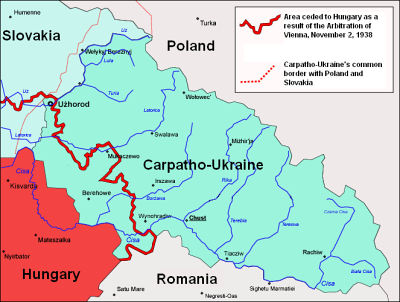
The Republic of Carpatho-Ukraine declared its independence from Czechoslovakia on March 15, 1939. It was annexed by Hungary the next day. It had been independent for only 24 hours.
In December 2006, Belgian public television station RTBF reported that Dutch-speaking Flanders had declared independence and that Belgium as a nation had ceased to exist. Panicked viewers placed 2,600 calls to the station and crashed its website as they sought further information.
The station kept up the story for two hours, then admitted it was a hoax. “It’s very bad Orson Welles, in very poor taste,” said a spokesman for Prime Minister Guy Verhofstadt. “We obviously scared many people,” acknowledged news director Yves Thiran. “Maybe more than we expected.”
Last Effects
In October 1864, Indiana farmer John VanNuys received a letter informing him that his son had been killed in the Battle of Chaffin’s Farm in Virginia. He had been shot in the throat while retreating from a line of Confederate rifle pits. “Within twenty minutes our forces rallied and took the ground,” wrote the quartermaster, “but while the rebels held the ground, they had stripped your son of everything except shirt and drawers.”
A few days later VanNuys received an envelope postmarked “Old Point Comfort, Oct. 10.” Inside was a note in his son’s handwriting:
This testament belongs to Captain S.W. VanNuys, Acting Ass’t. Adj’t. General 3d Brigade, 3d Div., 18th Army Corps. Should I die upon the field of battle, for the sake of a loving mother and sister, inform my father, John H. VanNuys, Franklin, Indiana, of the fact.
Below this someone had written:
Mr. John H. Vanings: It is my faithful duty to inform you that your son was killed on the 29th of the last month near Chaffins farm, Va. I have his testament. I will send it if you wish it. From your enemy, one of the worst rebels you ever seen.
The sender had signed it only “L.B.F.” His identity is unknown.
Seat of Knowledge
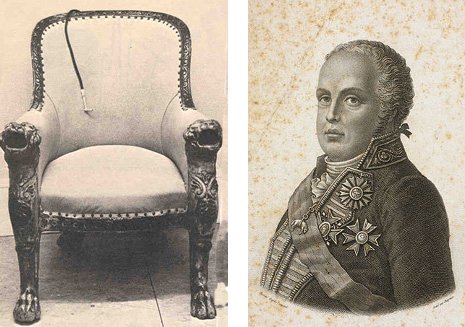
John VI of Portugal was hard of hearing, so he had a throne built whose leonine arms captured sound and directed it to a listening tube.
“Requiring anyone who wishes to speak with you to kneel and address you through the jaws of your carved lion might be fun for an hour or so,” notes neuroscientist Jan Schnupp, “but few psychologically well-balanced individuals would choose to hold the majority of conversations in that manner.”
Alfonso XIII of Spain was “the most tone-deaf man I ever knew,” remembered Artur Rubinstein. “From the time he was seven, he was accompanied by a man assigned to nudge him whenever the national anthem was played.”
Mail Call
From Andrew Carroll’s Behind the Lines (2005) — during World War II, the parents of William Kyzer received this letter from their son, an infantry rifleman stationed in the Pacific:
Dear Dad & Carmilita
I’m OK, days flies by here in
Well maybe it can be all again soon. I’m praying for it. Write soon Nothing like getting a letter from home. Here on
Love
Bill
P.S. They may censor this letter
Carroll writes: “In fact, Kyzer’s mail was not edited at all; he simply hated writing letters and only penned the few sentences at the top and bottom so that his folks would believe that the censors were responsible for slicing out the rest.”
A Dream in Alsace

Wandering the French countryside in 1914, German soldier Hans Fleischer made a remarkable discovery:
Through the thick underbrush, I meandered my way through a small path. Wonderful woods all around me. Not too long thereafter, I came upon a lighted area, and before me lay in the middle of a blooming flower garden, in peaceful silence, the castle of Baron de Turckheim. I stood struck in sight of it, and slowly I went closer to the gentle hills. Behind me lay Blamont. A wonderful picture, this little city with its red-brown roofs, built into a rolling valley, and marked by the old weathered ruins that Bernhard once destroyed during the Thirty Year’s War, and the high, double towered gothic church. Like an old, good Swabian town, there it lay, an image of freedom in the middle of the destruction of war. I went further through the garden and fields, past Weihern, and soon I stood on the terrace of the glorious construction. With astonishment, I climbed the stair and went in.
What a miserable image of destruction! The whole glory and wonder of this castle had become ruins and piles of rubble, everything cut down and in pieces, the wonderful chamber with its glorious library and its heavy, gold shrine, the woodwork covered room with its proud row of ancestor’s portraits, the lovely living room with its uncommon furniture — everything forever demolished. With a shudder, I went through the rooms. There! In one corner in the back — was that not a grand piano? I stood in my tracks, and then almost fell down with shock. Right! A grand piano: Steinway & Sons and untouched. A miracle! Finally, finally, music! How painful and with what longing I had missed just this holiest of all arts, and now I find in the middle of all of this rubble a grand piano! The room became like a temple to me, and I sat down as if at an altar. I began slowly, my fingers gliding tremblingly over keys no different than others I have played on. All of my longings became swelling tones that went out into the summer morning. They were holy moments of the blissful memories of the world, whenI was able to make music again for the first time. I awoke like out of a dream when I stopped.
But there! What was lying right under the piano? Did I see correctly? Right, sheet music! In haste I grabbed for the ‘The Valkyries.’ That was the culmination of my happiness, to find my Valyries here! Soon, the sound rang out. Joyously and then more so. The old, raw soldier’s playing became more relaxed, and seldom has a song of love and springtime and inner power emanated from me with more emotion. Outside, the destructive struggle between life and death, with all of its terrible incidents and gruesomeness — and here, in this moment, a German song of love. Rare, unforgettable hours! Feeling deeply fulfilled and happy, I had been taken back to my peaceful garden house. I was at home. I had made German music, and now I could go into war again. Blessed, I returned to my comrades.
From Andrew Carroll’s book Behind the Lines. Fleischer is believed to have been one of 95,000 Jews fighting for the German Army. If he survived, he would have been the victim of constant persecution in the Nazi regime, even having fought for Germany. What became of him is unknown.
Legal Grief
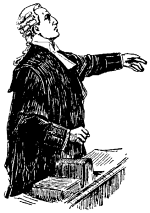
According to tradition, barristers wear black because they’re still in mourning for Queen Mary II, who died in 1694.
Or, properly speaking, they adopted black on Mary’s death at the wish of William III and have retained it as a convenient costume ever since.
Mary is most commonly cited; sometimes another Stuart queen is named. Sir Frederick Pollock, who served as Chief Baron of the Exchequer for more than 25 years, famously joked that the whole bar went into mourning in the time of Queen Anne (Mary’s younger sister) and never came out again.
He wrote, “I have always been told that formerly the Bar wore, in Court, coats, &c. of any colour under the gown, which also need not have been black; but that on the death of Queen Anne the Bar went into mourning, and since then every barrister has generally worn black.”
The Candy Bomber
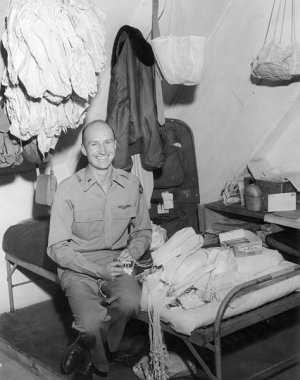
In July 1948, 27-year-old Air Force lieutenant Gail Halvorsen was flying food and supplies into West Berlin, which was blockaded by the Soviet Union. One night he encountered a group of hungry children who had gathered near the runway to watch the planes land.
“They could speak a little English,” he recalled later. “Their clothes were patched and they hadn’t had gum and candy for two or three years. They barely had enough to eat.”
Halvorsen gave them two sticks of gum and promised to drop more candy for them the next day from his C-54. He said he’d rock his wings so that they could distinguish him from the other planes. Then he returned to the base and spent the night tying bundles of candy to handkerchief parachutes.
Over the next three days he dropped candy to growing crowds of West German children. He had wanted to keep the project secret (“It seemed like something you weren’t supposed to do”), but when a newsman snapped a photograph Halvorsen began receiving boxes of candy from all over the United States, many with parachutes already attached. Halvorsen went home in February 1949, and the blockade was lifted three months later.
In 1998, when Halvorsen returned to Berlin, a “dignified, well-dressed man of 60 years” approached him. He said, “Fifty years ago I was a boy of 10 on my way to school. The clouds were very low with light rain. I could hear the planes landing though I couldn’t see them. Suddenly out of the mist came a parachute with a fresh Hershey chocolate bar from America. It landed right at my feet. I knew it was happening but couldn’t believe it was for me. It took me a week to eat that candy bar. I hid it day and night. The chocolate was wonderful but it wasn’t the chocolate that was most important. What it meant was that someone in America knew I was here, in trouble and needed help. Someone in America cared. That parachute was something more important than candy. It represented hope. Hope that some day we would be free.”
The Popgun War
Brothers Alphonse, Kenneth, and Mayo Prud’homme were playing with a foot-long toy cannon in Natchitoches, La., in September 1941 when they saw a man peering at them through binoculars from the opposite side of the Cane River. “We just fired a shot at him to see what would happen,” Kenneth remembered later. “He bailed out of the tree and went flying back down the road in a cloud of dust.”
Presently the man returned with infantry. “They started shooting back at us, and when they’d shoot, we’d shoot back.”
This went on for half an hour, escalating gradually. The boys’ father added firecrackers to their arsenal; their opponents set up smoke screens and readied a .155 howitzer. At last an Army officer appeared at their side and said, “Mr. Prud’homme, do you mind calling off your boys? You’re holding up our war.”
The boys, ages 14, 12, and 9, had interrupted war games involving 400,000 troops spread over 3,400 square miles in preparation for America’s entry into World War II. At the sound of the cannon, George S. Patton had stopped his Blue convoy and engaged what he thought was the opposing Red army. His men were firing blanks, but the maneuvers were real.
“That’s my one claim to fame,” Kenneth told an Army magazine writer in 2009. “I defeated General Patton.”
Two Islands
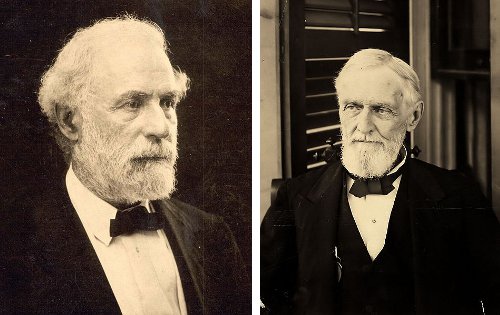
Robert E. Lee and Jefferson Davis both died without a country.
In 1865 Lee applied for pardon and completed an amnesty oath, fulfilling terms required by Andrew Johnson. But the documents were never recognized, and Lee died without citizenship in 1870. A century later a worker discovered the oath in the National Archives, and Gerald Ford restored Lee’s citizenship posthumously in 1975.
After the fall of Richmond, Davis was imprisoned for treason. When he emerged two years later, his citizenship was denied — he could not run for office, and he could not vote. Like Lee, he passed the remainder of his life without a nation; Jimmy Carter finally restored his citizenship in 1978.

